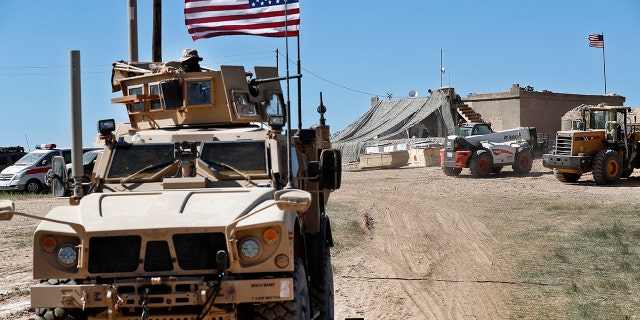NEWYou can now listen to Fox News articles!
The U.S. military launched a second set of strikes against Iranian-backed fighters in Syria less than 24 hours after airstrikes dropped nine bombs on targets in eastern Syria, a direct response to a militia attack that injured three U.S. service members.
“The United States will not hesitate to defend itself against Iranian and Iran-backed aggression when it occurs,” Colin Kahl, the undersecretary of defense for policy, told reporters Thursday, according to BBC.
Three U.S. service members were injured Wednesday in two rocket attacks on compounds housing American troops, with U.S. Central Command saying the service members were treated for minor injuries.
The U.S. responded to the attack by launching Apache helicopters to target a convoy of vehicles that took part in the attack, with military officials saying the strike killed two of the three suspected fighters.
US AIRSTRIKE IN SYRIA USED 8 MANNED FIGHTER JETS THAT DROPPED 9 GUIDED BOMB UNITS: OFFICIAL
Apache helicopter in flight
(1st Combat Camera Squadron, Photo by Tech. Sgt. Barry Loo)
The helicopter strike took place less than 24 hours after the U.S. used eight manned-combat aircraft to strike nine targets in Syria affiliated with Iran’s Revolutionary Guard Corps. The airstrikes came in retaliation for an attack on U.S. forces in Syria earlier this month, according to USCENTCOM.
“The strike in eastern Syria was in response to attacks by Iran-backed groups against US forces in Syria on August 15th and demonstrates our resolve to defend US forces and equipment,” USCENTCOM Commander Gen. Michael Kurilla said in a statement Wednesday.
The U.S. has roughly 1,000 troops stationed in Syria in the ongoing campaign against the Islamic State.
The attacks against Iranian-backed forces come as the U.S. continues to try to make progress towards a renewed nuclear deal with Iran. Reports this week indicated that the two sides may be closing in on an agreement.

U.S. forces in Syria.
(AP Photo/Hussein Malla, File)
CLICK HERE TO GET THE FOX NEWS APP
Speaking to CNN Wednesday, State Department spokesman Ned Price said that the strikes in Syria demonstrate the urgency in getting a deal done.
“If Iran were able to obtain a nuclear weapon, every single challenge we face with the Iranian regime would become more difficult,” Price said. “If we are able to take…the specter of Iranian nuclear weapon off the table, we’ll be able to address more effectively everything else that we face from Iran and from its proxies and the groups it supports in the region.”